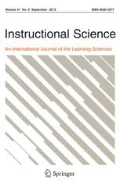Abstract
“Community” has become a commonplace term in the learning sciences. Alongside this popularization comes the view that communities are, in general, something to strive towards. We draw on contemporary trends to problematize this assumption and motivate a discussion for the productivity of dissent.
Similar content being viewed by others

Notes
We note, as Collins does, that conserving communities still involve a great deal of learning.
References
Bielaczyc, K., & Collins, A. (1999). Learning communities in classrooms: A reconceptualization of educational practice. Instructional-Design Theories and Models, 2, 269–292.
Brown, A. L., Metz, K. E., & Campione, J. C. (1996). Social interaction and individual understanding in a community of learners: The influence of Piaget and Vygotsky. Piaget-Vygotsky: The social genesis of thought (pp. 145–170). Hove: Psychology Press.
Collins, A. (1998). Learning communities: A commentary on chapters by Brown, Ellery, and Campione, and by Riel. In J. G. Greeno & S. V. Goldman (Eds.), Thinking practices in mathematics and science learning (pp. 399–405). Mahwah, NJ: Lawrence Erlbaum Assoicates.
Doebel, S., & Munakata, Y. (2018). Group influences on engaging self-control: Children delay gratification and value it more when their in-group delays and their out-group doesn’t. Psychological Science, 29(5), 738–748.
Dyson, F. (2008). The scientist as rebel. New York: New York Review Books.
Feyerabend, P. K. (1993). Against method. London: Verso.
Feyerabend, P. K. (2011). The tyranny of science. Cambridge: Polity Press.
Fong, C., & Slotta, J. D. (2018). Supporting communities of learners in the elementary classroom: the common knowledge learning environment. Instructional Science. https://doi.org/10.1007/s11251-018-9463-3.
Forscher, P. S., & Kteily, N. (2018). A psychological profile of the alt-right. https://doi.org/10.17605/OSF.IO/C9UVW.
Goodwin, C. (1994). Professional vision. American Anthropologist, 96(3), 606–633.
Hod, Y. & Ben-Zvi, D. (2018). Co-development patterns of knowledge, experience, and self in humanistic knowledge building communities. Instructional Science. https://doi.org/10.1007/s11251-018-9459-z.
Kapur, M. (2016). Examining productive failure, productive success, unproductive failure, and unproductive success in learning. Educational Psychologist, 51(2), 289–299.
Kuhn, T. S. (2012). The structure of scientific revolutions. Chicago: University of Chicago Press.
Lilienfeld, S. O., Ammirati, R., & Landfield, K. (2009). Giving debiasing away. Can psychological research on correcting cognitive errors promote human welfare? Perspectives on Psychological Science, 4, 390–398.
Ma, J. Y., & Hall, R. (2018). Learning a part together: ensemble learning and infrastructure in a competitive high school marching band. Instructional Science. https://doi.org/10.1007/s11251-018-9455-3.
Melser, D. (2004). The act of thinking. Cambridge: MIT Press.
Nagle, A. (2017). The lost boys: The young men of the alt-right could define American politics for a generation. The Atlantic. Retrieved from https://www.theatlantic.com/.
Smith, F. (1988). Joining the literacy club. Portsmouth, NH: Heinemann Educational Books.
Tao, D., & Zhang, J. (2018). Forming shared inquiry structures to support knowledge building in a grade 5 community. Instructional Science. https://doi.org/10.1007/s11251-018-9462-4.
Trninic, D., Wagner, R., & Kapur, M. (2018). Rethinking failure in mathematics education: A historical appeal. Thinking Skills and Creativity. https://doi.org/10.1016/j.tsc.2018.03.008.
Author information
Authors and Affiliations
Corresponding author
Rights and permissions
About this article
Cite this article
Trninic, D., Swanson, H. & Kapur, M. Productive dissent in learning communities. Instr Sci 46, 621–625 (2018). https://doi.org/10.1007/s11251-018-9466-0
Received:
Accepted:
Published:
Issue Date:
DOI: https://doi.org/10.1007/s11251-018-9466-0


